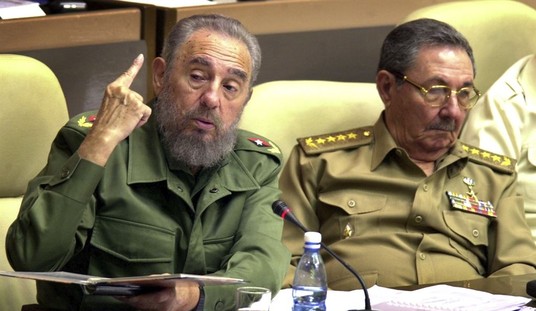Bill Gertz has an article running in this morning’s Washington Times, “Financial terrorism suspected in ’08 economic crash,” on a report prepared by the Department of Defense in June 2009. In the report, financial analyst Kevin Freeman argues that the 2008 economic crisis was assisted by outside forces. What the study (which we are providing a copy of exclusively here at PJ Tatler at the conclusion of this post) investigates is how outside forces could have helped things along by manipulating oil prices, naked short selling of U.S. financial firms (e.g. Bear Stearns), and attacking the U.S. dollar. Gertz reports:
Evidence outlined in a Pentagon contractor report suggests that financial subversion carried out by unknown parties, such as terrorists or hostile nations, contributed to the 2008 economic crash by covertly using vulnerabilities in the U.S. financial system.
The unclassified 2009 report “Economic Warfare: Risks and Responses” by financial analyst Kevin D. Freeman, a copy of which was obtained by The Washington Times, states that “a three-phased attack was planned and is in the process against the United States economy.”
While economic analysts and a final report from the federal government’s Financial Crisis Inquiry Commission blame the crash on such economic factors as high-risk mortgage lending practices and poor federal regulation and supervision, the Pentagon contractor adds a new element: “outside forces,” a factor the commission did not examine.
“There is sufficient justification to question whether outside forces triggered, capitalized upon or magnified the economic difficulties of 2008,” the report says, explaining that those domestic economic factors would have caused a “normal downturn” but not the “near collapse” of the global economic system that took place.
Suspects include financial enemies in Middle Eastern states, Islamic terrorists, hostile members of the Chinese military, or government and organized crime groups in Russia, Venezuela or Iran. Chinese military officials publicly have suggested using economic warfare against the U.S.
In an interview with The Times, Mr. Freeman said his report provided enough theoretical evidence for an economic warfare attack that further forensic study was warranted.
“The new battle space is the economy,” he said. “We spend hundreds of billions of dollars on weapons systems each year. But a relatively small amount of money focused against our financial markets through leveraged derivatives or cyber efforts can result in trillions of dollars in losses. And, the perpetrators can remain undiscovered.”
“This is the equivalent of box cutters on an airplane,” Freeman added.
It should be noted that Freeman doesn’t claim that outside forces were responsible for the major factors of the economic crisis, namely the subprime mortgage fiasco, but that these outside forces might have intentionally helped things along. The report identifies three key stages in this possible economic attack:
- The first phase was a speculative run-up in oil prices that generated as much as $2 trillion of excess wealth for oil-producing nations, filling the coffers of Sovereign Wealth Funds, especially those that follow Shariah Compliant Finance.
- The second phase appears to have begun in 2008 with a series of bear raids targeting U.S. financial services firms that appeared to be systemically significant.
- The risk of a Phase Three has quickly emerged, suggesting a potential direct economic attack on the U.S. Treasury and U.S. dollar.
Here’s the unclassified DOD report we’re making available exclusively here at PJ Tatler:









Join the conversation as a VIP Member